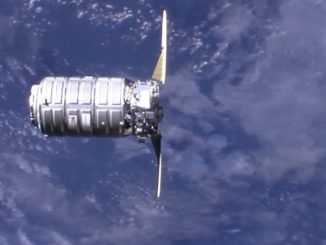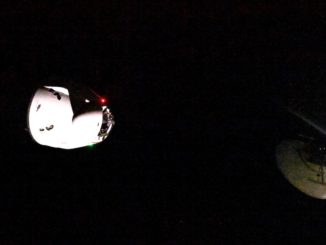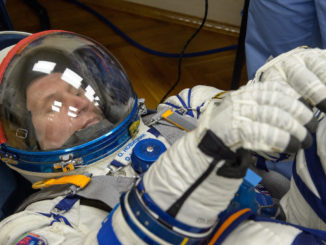
A Progress supply ship completed a two-day trip to the International Space Station early Wednesday, successfully guided in by cosmonaut Sergey Ryzhikov using a remote control console inside the station after an automated rendezvous system ran into trouble moments before docking.
The Progress MS-16 cargo freighter linked up with the Pirs docking compartment at 1:26 a.m. EST (0626 GMT) Wednesday) to deliver cargo before detaching with the module later this year to clear the way for the arrival of a new Russian research lab.
Ryzhikov, commander of the station’s seven-person Expedition 64 crew, was monitoring the spacecraft’s final approach, ready to take over a manual flight control system in case of a problem with the Progress freighter’s Kurs radar-guided automated rendezvous system. The Kurs system failed as the supply ship moved less than 70 feet, or 20 meters, from the space station, prompting the veteran cosmonaut to activate the TORU manual flight control system inside the complex.
Using controls inside the Zvezda service module, Ryzhikov guided the Progress MS-16 spacecraft to docking with Pirs, wrapping up the cargo ship’s trip to the space station after a launch late Sunday (U.S. time) from the Baikonur Cosmodrome in Kazakhstan on top of a Soyuz-2.1a rocket.
The cargo mission marks the 77th launch of a Progress supply ship to the International Space Station since 2000. The previous Progress cargo ship, Progress MS-15, undocked from the space station Feb. 9 and made a destructive re-entry into the atmosphere, getting rid of trash and clearing the way for the arrival of fresh cargo delivery.

The Progress MS-16 delivered around 5,424 pounds, or 2,460 kilograms, of cargo and supplies for the space station and its seven-person crew, according to Roscosmos, the Russian space agency.
The freighter’s payload includes about 3,086 pounds (1,400 kilograms) of dry cargo packed inside the Progress spacecraft’s pressurized compartment. There’s also 1,322 pounds (600 kilograms) of propellant to be fed into the space station’s Zvezda service module propulsion system, along with 926 pounds (420 kilograms) of fresh water and 89 pounds (40.5 kilograms) of pressurized gases to supplement the space station’s breathable atmosphere.
The Progress MS-16 spacecraft is also carrying equipment to help cosmonauts detect and patch leaks on the space station, plus Russian biomedical experiments and a research payload to study obtaining food and oxygen from algae in microgravity, Roscosmos said.
The supply ship will remain at the space station until July, when the Progress is scheduled to depart with the Pirs docking compartment in tow. The Progress MS-16 will guide itself, along with the disused Pirs module, back into the atmosphere to burn up at the end of its mission.
The Pirs module has served as a docking port and an airlock for cosmonauts on spacewalks since 2001. A similar module named Poisk serves a similar function, and will remain at the space station.
The removal of the Pirs module clears a docking port on the Zvezda service module, the central hub of the space station’s Russian segment, for the arrival of the long-delayed Nauka laboratory later this year after launch on a heavy-lift Proton rocket. The Nauka lab module will be the largest addition to the Russian segment of the station since 2000, when Zvezda itself was launched.
Email the author.
Follow Stephen Clark on Twitter: @StephenClark1.



